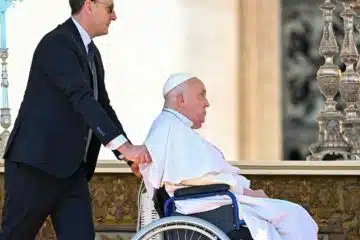The Vice of Indifference

A few months ago, I was struck by a seemingly ordinary phrase: “The time that we have.”
I’d heard versions of it before, but this time, it stirred something in my mind that wouldn’t go away. My habitual indifference toward daily life was, if only temporarily, extinguished. That is not to say that what replaced it was immediately pleasant, however. Every second was painfully fleeting, every moment acutely precious.
That single phrase wasn’t all that kickstarted it—I had already begun to see my loved ones differently. Their fragility stood out, as did the depth of my love for them. It scared me to think a day would come when I would never see them again, at least not in this life, and this overbearing awareness extended to my own mortality. While my faith gave me hope in Heaven, the specter of death cast a shadow over me.
Around this time, I was listening to a Jesuit retreat on audio. The retreat leader guided us through visualizing our own death, being laid to rest and returning to the dust from which we came. Morbid as it sounds, it helped me come to peace with my own earthly end. For my loved ones, however, I prayerfully imagined our final goodbyes, whatever form they might take. In these meditations, sadness overwhelmed me, but God’s consolation always followed. Wanting to repeat this practice, I wrote a reminder on my bedroom whiteboard: “Meditate upon death.”
I’d just begun this practice when my father suddenly passed away. There was no warning; he was a healthy man in his 60s. I could, and perhaps one day will, write a whole book about that beautiful man. It’s possible God was preparing me by bringing the transience of things to the forefront of my mind, but the immediate horror of the loss made it difficult to understand God at all. I never will understand God’s Providence while I’m on this Earth, but I pray that He keeps reminding me how precious our time is, urging me to spend every moment of it loving others.
Archbishop Fulton Sheen once said, “I wonder if perhaps our Lord does not suffer more from our indifference than He did from the crucifixion.” Indifference can be an abstract word to us, but in the 21st century, it shows itself most concretely in boredom—a refusal to actively engage with life. We might relate to someone who struggles with Jesus’ teachings, but what about the person who’s simply bored by Him? Regarding indifference, Sheen says, “I’m going to plead with you, therefore, not to be bored in life. The reason we’re bored is because we don’t love anything.”
You cannot simultaneously love something and be bored by it; love and indifference cannot coexist. The more we engage with life, the more we care about those around us and recognize the limited time we have, the more energy we find within ourselves. We observe this in the lives of the saints, including Mother Teresa. She once said, “The poor must know that we love them.” Her love translated into tireless action. Despite sleeping only four hours a night, she personally cared for thousands in Calcutta. Through the Missionaries of Charity, the religious order she founded, millions received medical care during her lifetime, including over 50,000 people with leprosy.
If we’re indifferent about the time we have, we’ll waste it. St. Maximilian Kolbe warned, “The most deadly poison of our time is indifference.” Do not let indifference take root in your heart. Choose to care about the person in front of you. Be attentive. Be generous. If you do, God will give you the strength to keep going with the time that you have left.
 Colin Rahill is the Director of Digital Engagement for the Archdiocese of Cincinnati, as well as an author and speaker. | [email protected]
Colin Rahill is the Director of Digital Engagement for the Archdiocese of Cincinnati, as well as an author and speaker. | [email protected]
This article appeared in the January 2025 edition of The Catholic Telegraph Magazine. For your complimentary subscription, click here.













